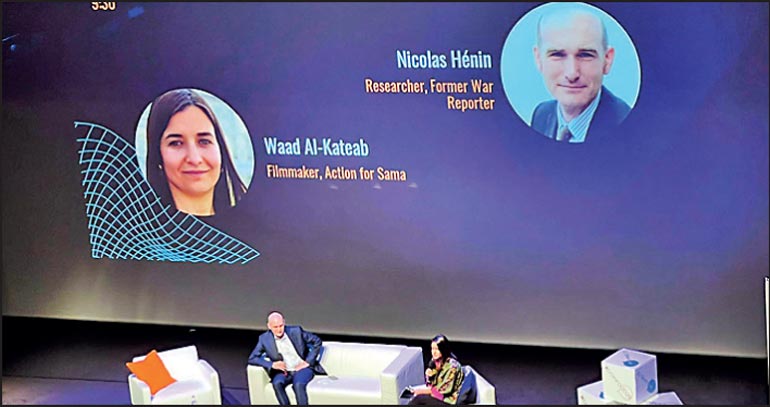Saturday Feb 21, 2026
Saturday Feb 21, 2026
Friday, 17 October 2025 00:22 - - {{hitsCtrl.values.hits}}

Author and journalist Nicolas Hénin (left) in conversation with filmmaker Waad Al-Kateab at Disinfo2025 in Ljubljana, Slovenia
By Charumini de Silva in Ljubljana
The two-day Disinfo2025 conference involving multiple stakeholders concluded yesterday in Ljubljana, Slovenia, addressing the rising threat of digital disinformation and the need for stronger international cooperation against manipulation and influence operations.
The event was supported by the Republic of Slovenia, with the European External Action Service (EEAS) as the main supporter.
It brought together global experts, policymakers, journalists, including from Sri Lanka, technologists, and civil society actors.
Held from 15 to 16 October, the conference featured multiple thematic tracks covering areas ranging from disinformation atlas and accountability and enforcement to community-driven resistance and spin zone analysis. Over 100 sessions, panels, and workshops explored topics including Artificial Intelligence (AI) and synthetic content, media accountability, and grassroots approaches to combatting disinformation.
A dynamic start with simulation and workshops
Preceding the main conference, on 14 October, it featured preparatory workshops, including “How to Protect an Election,” a simulation exploring the hybrid threats of misinformation, cyber attacks, and judicial interference during election periods. Another special session focused on disinformation trends in Sri Lanka and the Indo-Pacific, at which the media, including the Daily FT, and analysts shared regional insights on narrative manipulation in economic disinformation and fact-checking challenges. This session was organised by Internews.
Delegates also participated in workshops, setting the tone for collaboration and cross-border dialogue ahead of the main sessions.
Strong opening with global voices
The conference officially opened on 15 October with a high-profile plenary session featuring EU DisinfoLab President Diana Wallis, State Secretary for National and International Security Vojko Volk, and Culture Ministry State Secretary Marko Rusjan.
In their remarks, the speakers stressed that combatting disinformation requires a shared, multi-sectoral response that blends regulation, media literacy, and technological accountability.
One of the key highlights was the conversation between Nicolas Hénin, an experienced French author and journalist, who has covered numerous conflicts in Africa and the Middle East, and filmmaker Waad Al-Kateab, who reflected on how propaganda and disinformation have been weaponised in conflict zones such as Syria, turning narratives into instruments of control and fear.
Hénin also recounted his experience dealing with cyberbullying, noting that he managed it by refraining from any form of engagement.
The session underscored how digital influence operations deeply entwine with physical violence and geopolitical control.
Thematic sessions tackle AI, accountability and regional resilience
Over the two days, experts examined how disinformation has evolved into a sophisticated global threat.
Across multiple tracks, participants addressed how disinformation is weaponised in sectors such as health systems and public services, examining how false narratives are used to discredit institutions and science and credibility, unpacking how ideological misinformation targets scientific consensus.
A key session titled “Not So Artificial Threats” delved into the dual nature of AI, both as a tool for detection and as a generator of synthetic misinformation. Participants discussed the growing risks of “AI slop” and the poisoning of large language models through false data.
The accountability track drew considerable attention, especially during “Deterrence and Enforcement,” where legal and regulatory specialists debated how governments, social media platforms, and law enforcement can coordinate to ensure transparency without curbing free expression.
Another session, “FIMI Defenders in Action,” showcased grassroots initiatives to protect journalists and civil society groups from online harassment and disinformation campaigns, reinforcing the need for community-led resilience and mental health support for those on the information frontlines.
Meanwhile, “Mapping the Southeast and Beyond” brought perspectives from Asia, including Sri Lanka, Bangladesh, and the Philippines, highlighting how political narratives, digital propaganda, and economic pressures converge to shape regional disinformation ecosystems.
Emphasis on cross-sector collaboration
Throughout the conference, participants echoed the importance of cross-sector partnerships, connecting technology platforms, researchers, journalists, and policymakers.
Discussions also underscored how data transparency, algorithmic accountability, and digital literacy are critical in rebuilding public trust.
The event’s ‘Science and Credibility’ sessions explored how misinformation targets the foundations of science and medicine, particularly in health communication, while other panels dissected State-sponsored disinformation and its role in weakening democratic institutions.
A call to collective action
At the closing plenary, delegates reflected on the urgency of implementing the insights gained over the two days. The session summarised key recommendations, including establishing better early-warning mechanisms, supporting regional disinformation monitoring hubs, and integrating counter-disinformation strategies into broader digital policy frameworks.
Organisers and participants agreed that Disinfo2025 succeeded not only in sharing expertise, but also building an international coalition for truth and transparency in the digital era.
For Slovenia’s capital, the event marked another milestone in Europe’s growing role as a convening hub for information integrity and democratic resilience. As the curtains fell on Disinfo2025, one clear message resonated: the fight against disinformation is not confined to one nation, but it is a shared global responsibility that demands sustained vigilance, innovation, and cooperation.